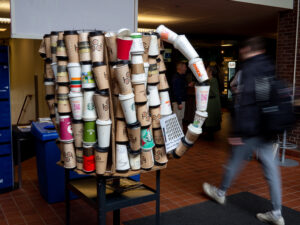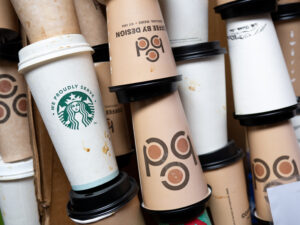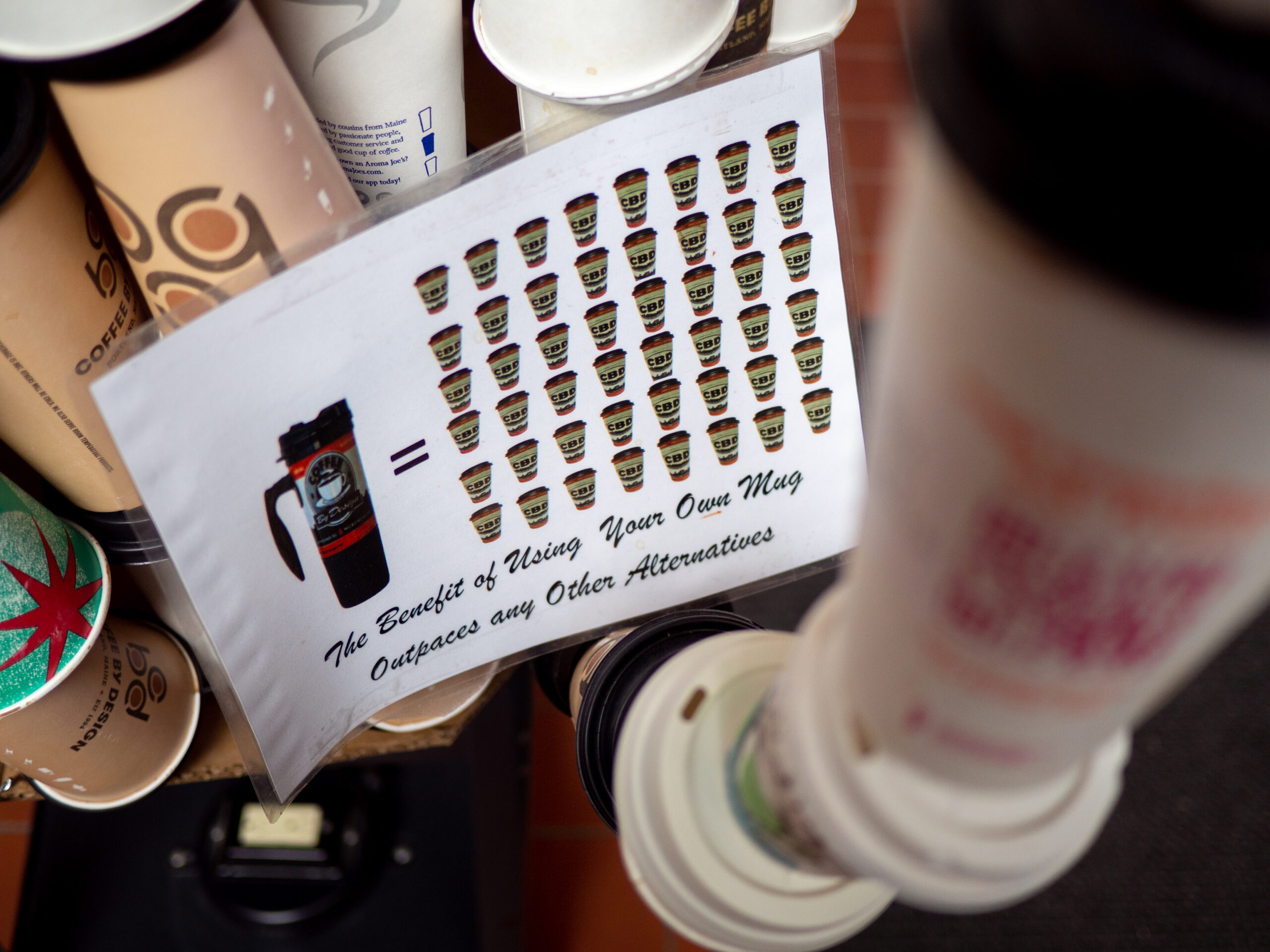As an out-of-state student, during your first time in a new state you often spend a fair amount of time comparing and contrasting the differences between your home and your new surroundings. Being born and raised in Vermont with little knowledge of life in other states, the first things I noticed about USM were the blue recycling and trash bins. Ever since I was in elementary school, Vermonters have had a separate bin for our food scraps for compost. This was especially apparent working in a fast food restaurant when our manager had told us the restaurant was going to get fined if we didn’t properly sort the compost. It was never something that any of us put too much thought into–it was always there. So, why is this not being done at USM?

On all three campuses, and even offering support online, USM has many different projects going on through the Office of Sustainability, directed by Aaron Witham. The goal of the Sustainability office is to mitigate impact on the environment while also providing education and support. If you’ve ever been to The Free Store in Lower Brooks, you’ve participated in a Sustainability project run by Eco-Reps. Eco-Reps are student workers, whether that be through work-study, internship, or volunteering, and they focus on different projects around sustainability on campus.
The Pollinator Garden on the Portland campus between Luther Bonney and Payson Smith is managed by Eco-Reps that are specifically called Pollinator Garden Specialists. “They’re installing native plants, they are doing research about relationships between plants and pollinators,” said Witham. “They’re looking at how plants and native habitat can help people with mental health issues.”
Another group of Eco-Reps are focused on transportation sustainability. They encourage people to carpool, take the bus, bike, or walk more frequently to help the environment. Alongside the Eco-Reps working at The Free Store and in residential halls, this group of Eco-Reps are also just focused on providing general information about sustainability to students.

The Eco-Reps are also overseen by Steven Sweeney, the Resource Recovery Supervisor. Sweeney specifically is in charge of trash and recycling programs, along with composting on all three campuses.
“I’m totally cool with Vermont’s composting laws,” said Sweeney, “but public composting just doesn’t work here.” Currently, the only composting being done at USM is through Sodexo, at Brooks Dining Hall and the cafés in Luther Bonney and Bailey Hall. The employees are responsible for separating the food waste from trash and recycling, which is then picked up by Garbage to Garden, a curbside composting service operating in parts of Maine and Massachusetts as well. One-third of all the food served at USM becomes waste, and so far, we have produced 73.3 tons of food waste this year. Pre-COVID, USM had collected over 108 tons of food waste in 2019.
Sweeney explains that public composting hasn’t worked on campus because there aren’t enough students that care. As soon as one plastic silverware ends up in a compost bin, it’s contaminated. While public composting hasn’t shown signs of success, volunteer composting has. Currently, people in Wishcamper Center have expressed an interest in composting, so Sweeney gives them a Garbage to Garden bucket with instructions on where to bring the scraps when filled. Before construction started where the Woodbury Campus Center used to be, people there also participated in composting. Similar projects have been conducted in the past by USM students in their own residential dorms. While this doesn’t bring in a lot of food waste, it is definitely a step in the right direction.
There have been a few small changes attempting to reduce the amount of food being wasted at the dining hall specifically. One of these improvements was getting rid of the trays students used to carry their plates of food. “We noticed that with these trays, students were piling as much food as they could, and they wouldn’t eat it all,” said Sweeney. Since the change to smaller plates, students are less likely to over-fill their plates, reducing the amount of waste. Ideally, according to Sweeney, USM should shift away from the buffet-style to further cut back on food waste: “But that’s what the students want.”
Another thing that many students aren’t aware of is that if they bring their own reusable cup to the cafés on campus, they will receive a discount on their coffee. Sweeney says this is due to the cost of packaging, manufacturing, and transporting these coffee cups. To bring more attention to this, Sweeney built the large sculpture made from coffee cups seen in Luther Bonney.
One of the unique things about the blue trash and recycling bins is the liquid waste compartment which reduces a lot of weight being thrown into the trash. By reducing the amount of weight in our trash, we are saving space and money, as these liquids can be poured down the drain without any cost. Sweeney had hand dryers installed in the bathrooms a while back to cut down on the amount of money USM spends on paper towels, including transportation, as well as save on the amount of paper towels going into the trash.
The staff at USM can only do so much. We, as students, need to take responsibility for our waste and do what we can to reduce our carbon footprint. While USM has made the commitment to be carbon neutral by 2040, as individuals we need to accept that we have a part in this as well, and we can take steps now to help.
“Don’t get discouraged,” Witham said. “Just start with one thing you can make a difference on. If you’re lucky enough where you have the space, see if you can plant some native wildflowers. If you’re somebody who doesn’t have control over that, maybe you can compost with a worm-composting system.” Red Wiggler Worms are available online, which is a great way to start composting at home. “Just think of one thing you can make a difference on in your daily life, and focus on that one thing.”
“Everyone can make a difference one cup at a time, one bottle at a time,” said Sweeney. “The more we do in recycling and composting, the more money and resources we save. Think about what you want future generations to have.”
To get involved, contact the Office of Sustainability through the USM website or by emailing Aaron Witham at [email protected], or calling them at 207-753-6507 between the hours of 8 a.m. to 4:30 p.m. on weekdays.


i am the best writer ever